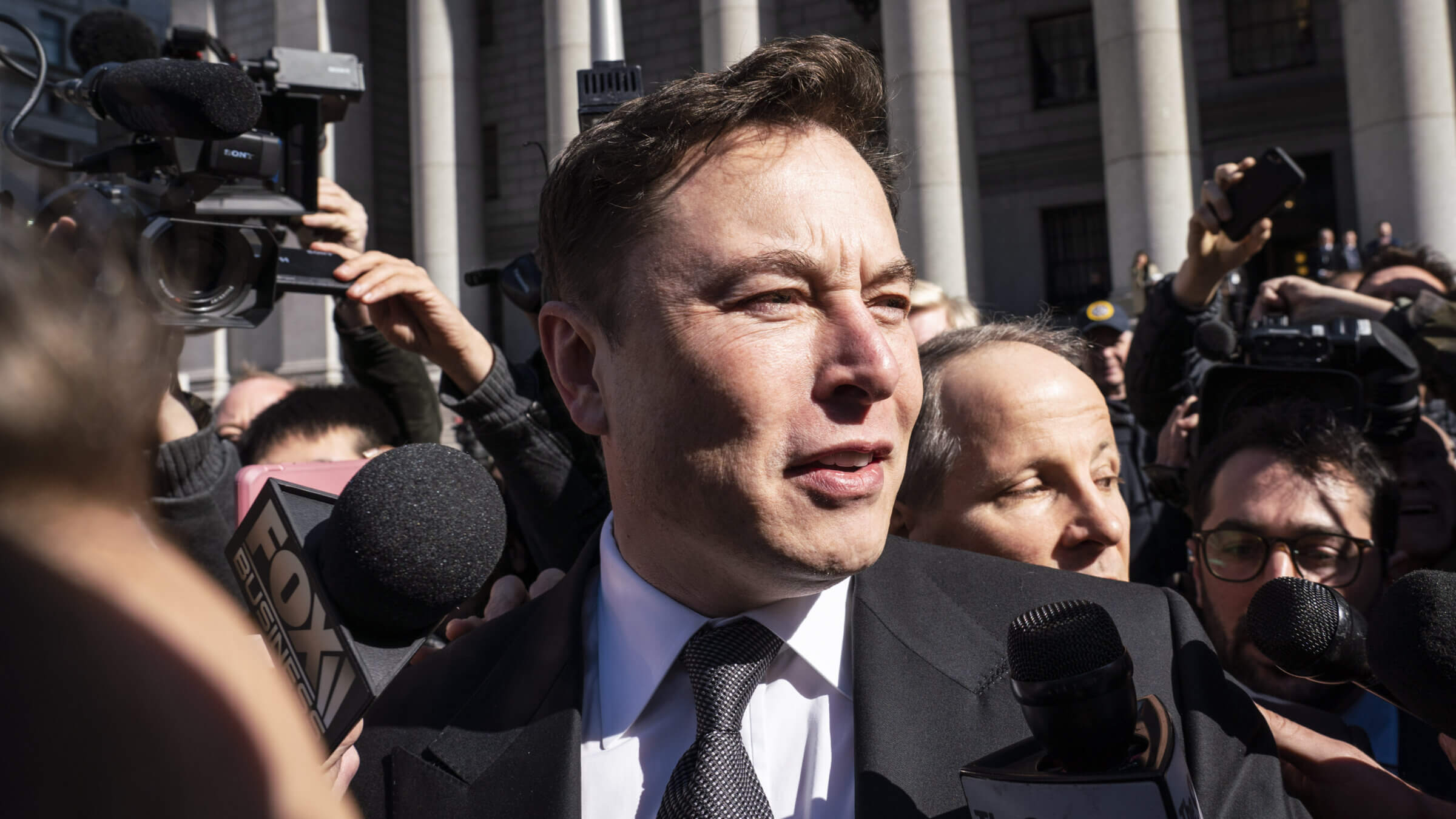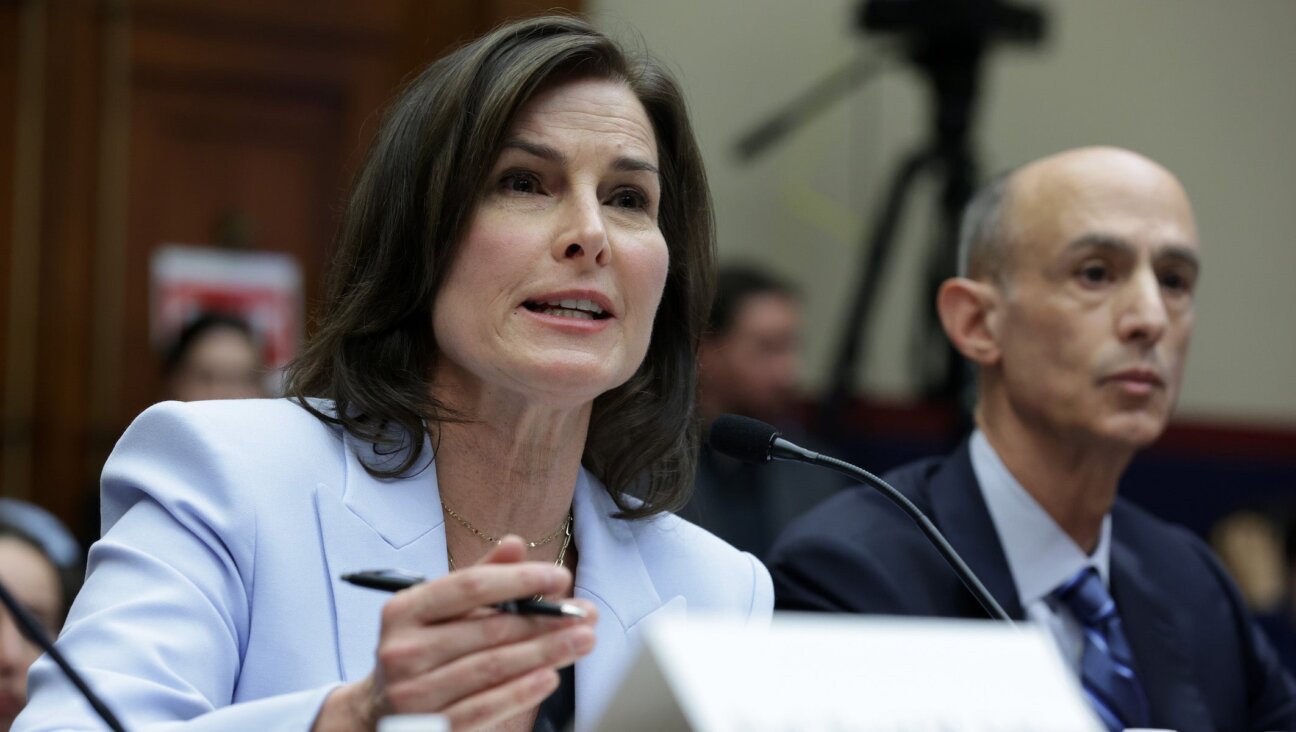Elon Musk’s vision for Twitter endangers Jews and other minorities
Social media sites with no limits on free expression have emboldened mass shooters and those who exploit minors to take their hate offline

Elon Musk departs from federal court in New York on Thursday, April 4, 2019 Photo by Natan Dvir/Bloomberg via Getty Images
The news that Elon Musk will acquire Twitter for $44 billion has commentators abuzz, as do his repeated assertions that he is making this purchase to promote free speech.
Musk is a self-described “free speech absolutist” who advocates for freedom of expression with as few restrictions as possible. Musk will likely loosen, if not completely remove, the current rules around what is and is not acceptable on Twitter.
This will be, to put it mildly, bad for everyone — and those concerned about the safety of vulnerable minorities must understand why.
A Cautionary Tale
The social media sites with no limits on free expression have all had disastrous — often deadly — results.
In a 2011 “Ask Me Anything” thread, one Reddit user asked why sexual images of minors — and a community called “picsofdeadkids” — were allowed on the platform. General manager Erik Martin answered that while he found such content “gross,” he didn’t want “to be the one making those decisions for anyone but myself, and it’s not the business Reddit is in. We’re a free speech site with very few exceptions.”
In addition to allowing content that exploits minors, Reddit also became known for hosting extremist communities. One anti-Black subreddit made headlines for celebrating the Charleston church shooting.
For years, the Holocaust subreddit was run by Holocaust deniers — and ironically, Reddit’s moderation tools were used to kick out anyone who disagreed. The site has for years been a hotbed of antisemitism, where groups of 60,000 or more will come to share antisemitic and Holocaust-denying jokes and memes.
In the United States, all of this speech was technically legal and thus has been supported by various Reddit CEOs. Alexis Ohanian, one of Reddit’s founders, bragged that he thought that the founding fathers would consider the site “a bastion of free speech.”
Free Speech Absolutism Is Deadly

Reddit is tame compared to other sites.
4chan, founded in 2003, requires no username to post. Users initiated one of the first cyberbullying campaigns, sending death threats to an 11-year-old girl.
But even 4chan has (loosely enforced) rules against “doxxing” (giving our personal information for the purposes of harassment) and posting false information. They eventually banned a controversial community after it started #GamerGate, a harassment campaign against female gamers.
It was this ban that led to the creation of 8chan, an even less regulated platform. It soon became home to a community devoted to inspiring mass shootings, where users discussed how to obtain weapons and shared manifestos of mass shooters.
In one year alone, three mass shooters were inspired to take action. The El Paso, Christchurch and Poway shooters all posted their manifestos on 8chan. Things got so bad on the platform that Brennan has since disavowed the site he created and has called for it to be shut down.
The QAnon conspiracy also originated on 8chan, and it’s where “Q” would post their updates. It was also a hub for planning the Jan. 6 insurrection, with users plotting the murder of politicians.
8chan is not alone. Parler, also devoted to free speech absolutism, was used by the Jan. 6 insurrectionists to plan their assault on the capitol. Gab, another anything-goes platform, was the social media site of choice for the attacker of the Tree of Life Synagogue in Pittsburgh.
What This Means For Twitter
For years, Twitter claimed that it was the “free-speech wing of the free-speech party” governed by a simple philosophy: “The Tweets Must Flow.”
Then in 2014, the #GamerGate controversy spilled over from 4chan and 8chan and onto Twitter.
This moment in social media history showed Twitter executives what can happen when hatred goes unchecked: suddenly, thousands of angry men who had been seething in these communities came to share their hate on Twitter.
Facing stagnant growth and a dip in active users (not to mention a flurry of bad press) during the height of #GamerGate caused Twitter to finally acknowledge that it could not maintain its mainstream status without addressing these growing concerns.
Then-CEO Jack Dorsey later explained that Twitter would begin moderating its website more aggressively: “…we believe that we can only serve the public conversation, we can only stand for freedom of expression if people feel safe to express themselves in the first place.”
Most people don’t enjoy spending time on platforms rife with hate and abuse. And when you don’t moderate social media sites, that is exactly what happens.
As he takes the company private, Musk will have to make the same choice for Twitter: either continue to improve moderation and reap the benefits or commit to free speech absolutism and suffer the consequences.
There are already posts on 4chan encouraging users to boost hate accounts on Twitter to test how much abuse they can get away with. It is hard to imagine a world in which free speech absolutism would not result in far more extremism, hate crimes and mass shootings targeting vulnerable minorities.
You Don’t Know How Bad It Can Get
For some, it is easy to feel as if Twitter can’t get worse: it is already chaotic, badly managed and prioritizes growth over moderation. But even if Twitter’s moderation policies are currently lacking, they still exist.
Embracing Musk’s absolutist dream is a fool’s errand, and it will put all minorities and vulnerable communities in danger. As alarmed as many are today, the alarm bells must continue to ring even louder.
To contact the author, email [email protected].
























